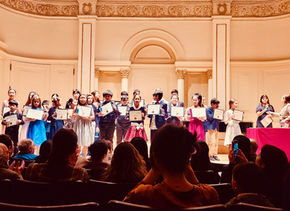
Anh Rozman
“ Without craftsmanship, inspiration is a mere reed shaken in the wind.”
J. BRAHMS
Anh Rozman has been teaching world class methods such as the Faber Adventures, Schirmer’s Library and Suzuki method to students in Paris, New York City and Connecticut since 2008. Her best students have performed at Weill Recital Hall of Carnegie Hall and won many prizes at prestigious festivals like Steinway & Sons Junior Piano Competition, Elite International Music Competition, Deborah Kahan Competition, Schubert Club Awards Competition, Young Artist Showcase, Suzanne Culley Competition, Connecticut Bach Festival, and National Young Maestro Competition. She is also on the faculty of Stamford Music & Arts Academy, Newtown Suzuki Music School and Ridgefield Suzuki School. As an active member of the Schubert Club, and Music Teachers National Association, she's committed to ensuring that the classical music genre continues to be popular with the younger generation of today.
What’s Mrs. Rozman's curriculum?
Mrs. Rozman's lesson plans are designed for beginner to advanced students. Her plans will help the student progress through a program that will introduce and internalize the knowledge, skills and abilities (KSAs) indicated below. After the first lesson, a decision will be made concerning the books that best fit the student's level and skills. A semester of 20 weekly lessons will familiarize the student with these KSAs using the most effective learning styles and approaches. The student will enjoy a progressive, fun and curiosity generating experience that maintains learning consistency throughout the 20 lessons.
Perseverance and student focus are key to success in achieving lasting progress. Some of the important KSAs are:
🖐 Review the fingerings 🖐
✊ Build a relaxed and curved hand position ✊
🎵 Learn basic music notations and theory notions for rhythm 🎵
🎹 Find note names on piano keys 🎹
🎼 Read and write notes on Treble G clef & Bass F clef 🎼
👁 Recognize Time Signatures 👁
b # Understand each of 7 flats Key Signatures,
and each of 7 sharps Key Signatures b #
❤️ Listen and follow a metronome for steady tempo ❤️
😎 Play 12 major Scales, its relative 12 minors Scales, and Arpeggios 😎
👂 Analyse Harmonies, Chords, Cadences, and Musical Forms👂
👏 Play your favorite music 👏
Some conditions and aspects of a student program necessary to support effective lessons are listed as questions below.
How long should the weekly lessons be?
For a very young age child under 5 years old only, lessons may start with a 30 minute weekly lesson. A 45 minute to 1 hour weekly lesson is recommended for children above 5 years old, and adults. Typically each lesson starts by reviewing hand position, warming up with the scale and arpeggios for student finger exercises. This is followed by a step by step building upon the student's selected pieces.
The student at this point is welcome to explore and learn some favorite songs for fun. For more advanced level students, etude pieces will be introduced to develop the student's dexterity and technique.
As student ability and capability develop, the instructor and student will determine which festival and competition levels to be pursued, and begin work to prepare when a selection is decided. 🏆🏆
How students should practice at home effectively?
For beginners, practicing around 30 minutes to 1 hour each daily is recommended. A student may divide this block of time into smaller segments to better fit into a day's schedule. However, it is preferred and usually provides best results if the same designated time is used each day. This approach builds good habits that support piano playing excellence. Parents are critical to the process of student learning and their encouragement of their children to focus on the required learning for each lesson will add significantly to what the student learns and retains. Parents are important "home teachers" in the process of learning.
Slowly, the student will learn to practice independently. The student will develop the skill to break the practice into smaller and shorter sections, and be able to repeat each passage well. A student practicing well will lead to playing well. Love of practice will follow with a desire to play and will lead to a love of the musical instrument. In time the student will be motivated by this love of the instrument to practice pieces for one or more hours to perfect technique and skill in playing a piece.
At this later stage of practice when the student has learned how to repeat effectively, step by step, and understands how to disentangle a difficult situation independently, the student will be at a new level of skill and achievement. At this point, the student is not concerned about how much time is being spent on practice, but about how many necessary skills are being mastered, understanding "the secret concepts”, and the ability to teach oneself! ❤️❤️
What’s type of piano should students have?
To start, the student can learn on a weighted full size 88 keys electric keyboard. After several months of serious practice, the student's fingers, technique and musicality will require a real acoustical piano, an upright piano is preferred. A good baby grand piano is the most ideal for achieving finger piano key touch control, and finger tip sensitivity. 🎹🎹
Thank you for trusting in me to help you with your beautiful musical journey.
🎵🎵















































































